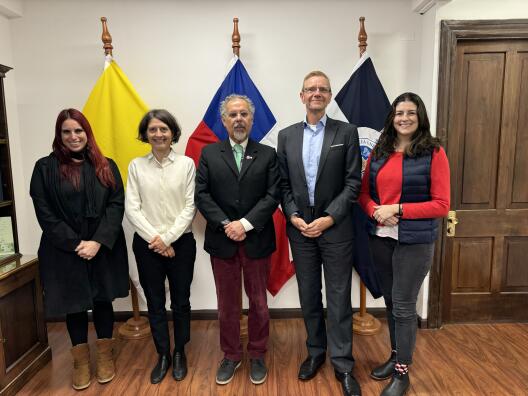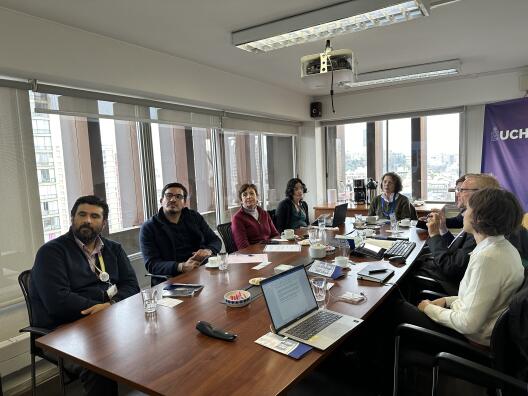Last stop of the fact-finding mission: Chile

The last leg of the trip took place in Chile, a country with numerous joint publications with the University of Münster. In fact, two of the visited local universities (University of Chile and Pontifical University of Chile) are at the top of the list of co-authorship in Hispanic Latin America. This time, the delegation was accompanied in most of its appointments by another representative of the University of Münster: Prof. Dr. David Bendig, professor of Entrepreneurship, who is at the moment doing a sabbatical in Santiago at the University Adolfo Ibañez as a lecturer in the master’s programme in International management (CEMS). Prof. Bendig is eager to expand his local connections and has already established contacts with Chilean innovation labs, as he is closely linked to the REACH-Euregio Startup Centre.
As it was the case in both previous countries, the visit started with fruitful conversations with local experts of the local academic landscape. Dr. Thomas Schmitt and Larissa Grütz, from the German Embassy in Santiago, shared insightful comments and gave an outlook for the near future, as the local government has recently announced a large investment in research for the universities in the upcoming years.

In addition, a meeting with the academic director of the Heidelberg Centre for Latin America, Dr. Inés Recio, was enlightening as the activities of the University Heidelberg set a benchmark for the collaboration of Germany with Chile– even scholars from Münster have already engaged in some initiatives.
In Chile, the delegation visited a total of five universities, starting at the University Andres Bello (UNAB), the largest in the country with around 60.000 students and also the top university regarding the number of incoming international students. Since 2022, there is an active Memorandum of Understanding with the Institute of Plant Biology and Biotechnology (IBBP) of the University of Münster, which reinforces the longstanding and deep connections in this research field, headed by Prof. Dr. Dirk Prüfer. The delegation discussed with the General Director of International Affairs, Prof. Isa Kort Garriga, ways to extend the collaboration to other fields.

The next day, a bus ride took the delegation to the coastal city of Valparaíso, which combines an important harbour with a colourful and cultural flair. There they were hosted by the Pontifical Catholic University of Valparaíso (PUCV), with whom the University of Münster has previous and ongoing collaborations in the fields of Physics, Biotechnology, Pharmacology and Mathematics. Besides, a researcher from the Institute of Geography and member of the StadtLabor Münster, Dr. Severin Halder, is currently in the city collaborating with PUCV. Among other topics, plans were discussed for a visit of a student group and also from the International Office of PUCV to Münster.
In the afternoon back in Santiago, the delegation visited the largest public university: University of Chile, with whom the Brazil Centre has identified 23 joint publications in the past 10 years in the Scival-database. The group was welcomed by representatives from the International Office and from the faculties of Medicine and Natural Sciences. During the discussion many common interests and even common partners were identified, such as the University of São Paulo and the University of Twente.

In the words of Prof. Dr. Alicia Salomone, Director of International Relations, “having the same partners means that we are on the same path”.
On the following day, it was time to meet Chile’s best-ranked higher education institution, the Pontifical Catholic University of Chile (UC). An impressive number of 41 joint publications since 2014, several cases of mobility of (young) researchers and lecturers and a soon to be signed agreement with Münster’s Musikhochschule marks the fruitful path that connects both universities. The already broad array of areas might even increase, as UC suggested to strengthen the collaboration in a more strategic manner. One way to enable proximity is seen in the similar internationalisation funding lines that UC and UM offer for the mobility of researchers. Furthermore, an agreement between UC and DFG, opens the possibility to submit joint research proposals. On Friday, a meeting with Prof. Dr. Stephan Ruderer from the Institute of History of UC, who formerly worked at Münster University for many years, provided the opportunity to visit the beautiful campus of San Joaquín and the Innovation Centre UC, located in the award-winning building of Chilean architect and professor Alejandro Aravena.

The last meeting took place at the Peñalolen campus of the University Adolfo Ibañez. The breath-taking view of Santiago and buildings awarded with architectural prizes were site to a large meeting that even included two exchange students from Münster, who have recently started their semester abroad at UAI studying law and business administration. Here, the ongoing cooperation with Münster’s Faculty of Economics and Business Administration should become even closer, as Prof. Bendig is dedicated to explore any potential collaboration initiatives.
Overall, the unique geography of the Andean country provides a broad array of climates, biomes and topography, making this long and narrow country very attractive for researchers. From the vastness of the Atacama Desert and its clear skies ideal for astronomical observation, the long coastal shore filled with wildlife and uphill where monitoring active volcanoes is a daily task, scientists can find answers to many of their questions in one of the so called “Natural Labs”.

Besides, Chile offers interesting collaboration opportunities in the social sciences and the humanities due to its cultural diversity, its particular historical and economic development and its strong connections to Germany, as expressed in the popularity of the German language.
The fact-finding mission of the Brazil Centre’s delegation ended in Chile after two intense and very productive weeks. Along 20 meetings in eight cities - which took the delegation through different seasons, climates and time zones - the fruitful discussions held and the wealth of information collected revealed a fertile ground for the expansion of the UM’s activities in research and education to the three countries visited, where all the partners met showed great interest in strengthening cooperation with UM.

